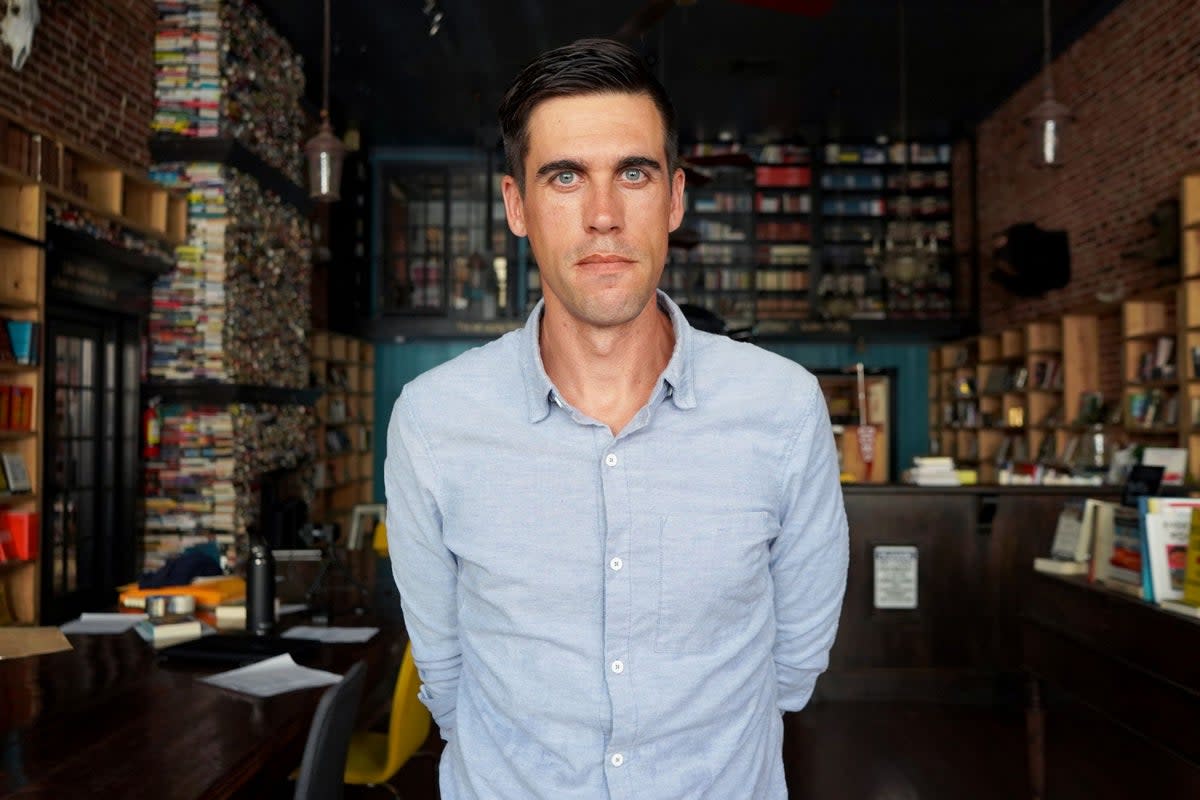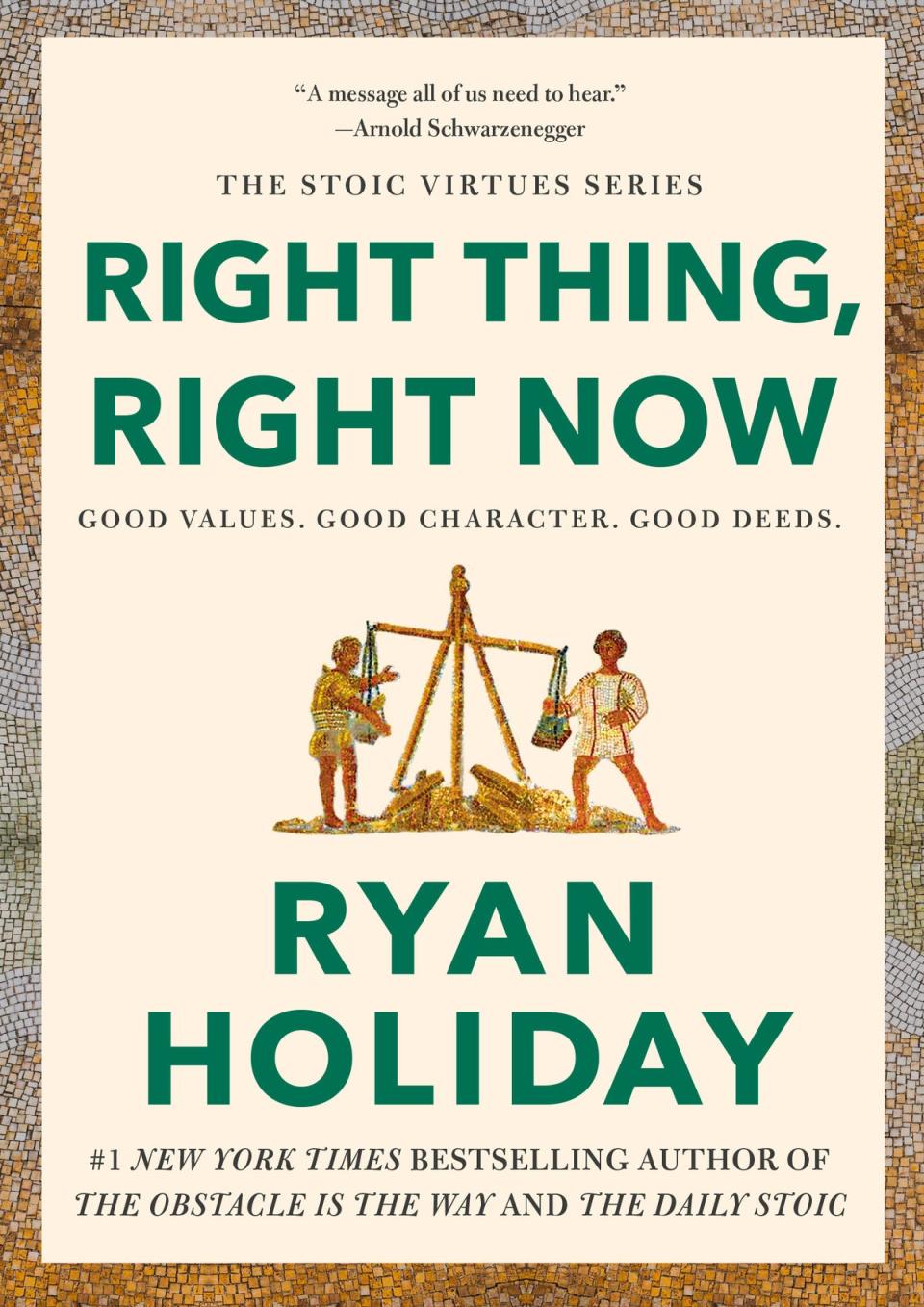Meet Ryan Holiday: the author who says we need more grit

Listen here on your chosen podcast platform.
The American historian Will Durrant once wrote that nations are born stoic and die epicurean: a catchy but misleading aphorism that has led people to conflate stoicism and apathy. A far more accurate explanation for the philosophy of Epictetus and Marcus Aurelius was written last month by Melanie McDonagh in this very paper. Stoicism, she wrote, is “the opposite of snowflakery, and the cult of being perpetually offended by other people’s speech and the general embrace of victimhood.” And so it is, as it has always been, that great minds emerge in reaction to the spirit of the day. Enter Ryan Holiday, host of the podcast The Daily Stoic, author of eight books on the matter and a man once asked to be Donald Trump’s director of comms (he turned the job down).
Holiday, 36, is a sprightly and decidedly modern ambassador for an ancient philosophy with roots in Classical Greece. A university dropout at age 19, he began his career consulting for the authors Tucker Max and Robert Greene, before swapping writers for brands and serving as Director of Marketing for fashion behemoth American Apparel. His interest in Stoicism dates back to reading Epictetus during his brief stint at the University of California (and, before that, becoming familiar with Marcus Aurelius via the Ridley Scott film, Gladiator).
After gaining notoriety for his writing on media manipulation, he returned to the subject that’s now made him a definitive star. “My publisher was like, what is that?” when he first pitched a book on stoicism in 2012. “They gave it a summer release date and paid me half of what I’d gotten for my first book.” Naturally, he sold millions. His latest book, Right Thing, Right Now, came out earlier this week.
“I think the reason we’re seeing a resurgence of Stoicism is because we understand on some level that we are not particularly resilient as a culture,” Holiday says on the latest episode of Brave New World. “I see a certain softness.” A comment that may lead some to think he’s just another anti-woke, pro-offense rent-a-gob. Which he isn’t.
I find the left and the right to be equally fragile, and prone to overreacting when their ideas and identities are challenged
Ryan Holiday
“It’s perfectly possible to have ‘conservative’ beliefs and know what the obvious right thing to do in 2020 is,” he wrote on Instagram ahead of the 2020 election, defending his support of Joe Biden despite his own typically Republican attributes, listed thus: “we own guns, raise cows for meat, prefer low taxes, fly an American flag”. Holiday lives in Texas with his wife and two young boys (“my stoicism is constantly tested in that sense”). He also runs an independent bookshop and led a fundraising campaign in 2020 to push for the removal of two Confederate monuments from his local county courthouse, donating $10,000 himself.
Holiday is hard to pigeonhole as Left or Right-wing (“I find both sides to be equally fragile,” he says, “and prone to overreacting when their ideas and identities are challenged”). He is even harder to square: a human high-low, rhapsodising on notions of Roman honour one minute and referring to Marcus Aurelius as “my guy” the next.
Holiday makes a strong case for variety. “We lack the ability to deal with unpredictability,” he says. “When you surround yourself only with people who think like you and talk like you and tell you what you want to be true,” we fail “to develop a strong immune system that can deal with disagreement, tension, or challenges.” Holiday brings up a 2022 study by the Pentagon which showed that 77 percent of young Americans would fail to qualify for military service; among the reasons for disqualification, mental ill health stood at 4 percent, just under physical ill health at 7 percent.
Ease is corrosive, he argues. We live in a world where “the food [we] want is delivered to [us] without [us] having to get off the couch,” where we can “only find and enjoy things that are pleasant to [us]”. Ironically or inevitably, then, our culture is one in which “people work themselves up into anxiety and worry over anything,” Holiday says. “That’s what drives attention.” America and the US media tend to “treat the rise of every trend or anything popular as something to be worried about”.
There are concerns among critics that Stoicism is a “masculine” philosophy, for instance, or that it fails to encourage change or progress because it simply “accepts the status quo”. Holiday concocts a fake but evocative headline: “This philosophy from Greek slaves is taking Silicon Valley by storm.

But stoicism is, at its core, about self-control. What happens to us, we cannot determine; but we can master “how we respond”. Holiday concedes this is though in our tech-addled age. “It’s harder to practice in the modern world,” he says. “When we have, the internet; we have devices; it’s easier to travel.” Still, we underestimate the similarities between us and the Ancient world that make Stoicism so continually relevant. When reading, for instance, Seneca’s description of the noise pollution in Rome, or Marcus Aurelius’ meditations on power and success, Holiday wonders: “Are they talking about where I am right now?”
The Meditations were a revelation when he first read them in his early twenties. “I didn’t know there was such a roadmap for how to be a good person, for how to be a strong person, for how to be a resilient person,” he says. “Where was this when I was 15 or 16 years old?” An example he returns to time and again to illustrate the power of Stoicism in recent history is the Missile Crisis. For 13 days in 1962, President Kennedy remained steadfast in his order of a naval blockade, against the advice he’d received to carry out an air strike on Cuban soil to compromise missile supplies. This patient, less aggressive course of action prevented a literally nuclear escalation of tensions between the US and the Soviet Union. Kennedy understood, Holiday says, that “space and time [were] his friends,” and that people tend to “come to their senses”.
This is harder, of course, in a world of tweets and breaking news. “The single biggest problem for leaders in the information age is a lack of time and space for reflection,” he says, quoting the US veteran General Mattis. “When you have emotional leaders and factions” led by “the whims of the algorithm” and the “news cycle”, “wise decision making” is nigh impossible. “If we don’t have leaders who can still their emotions and see through the murkiness of a situation – if they can’t let things settle – it’s not going to end well for any of us. […] This is the reality of the conflict in Ukraine; this could be the conflict between the United States and Taiwan.”
Holiday is uneasy with our live consumption of stories as they unfold, “as if knowing [what happened] 20 minutes earlier is going to change anything for us.” “I would argue,” he adds snootily, “that one should never consume television news if you can’t fully understand what an entertainment driven medium it is.” A bit pedantic, I think: but I’m a media proprietor, so maybe a tad biased.

Holiday is a child of new media. His emission The Daily Stoic is the twelfth most popular education podcast in the UK. “I think the Stoics would have loved the invention of the podcast, the idea of a recorded conversation between two people talking,” he says. “Seneca’s letters survived as an ongoing discussion with his friend Lucilius; Marcus Aurelius’ Meditations are the private journal of [a] very powerful man. [The Stoics] weren’t trying to write books in the way that I write books for an audience. They were doing this for themselves.”
Perhaps that is what matters most. “We obsess over what’s happening at a global or national level,” Holiday says, “and we neglect what’s happening at an individual level.” Ten percent of Americans took part in the recent local elections, practically absent from the news cycle due to the hype and anticipation around the presidential race, he notes. Stoicism is about “understanding where one can have influence in their own life,” and in that sense is not “masculine” or accepting of the status quo, but rather empowering. “The government isn’t doing anything about global warming,” says Holiday. “Maybe we need to figure out technological solutions to these problems.” Take matters into our own hands? I think I can get on board with that.


